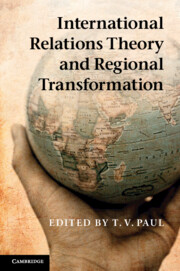Book contents
- Frontmatter
- Contents
- Figures and tables
- About the contributors
- Acknowledgments
- Part 1 Introduction
- Part 2 Realist perspectives
- Part 3 Liberal perspectives
- Part 4 Constructivist perspectives
- 8 Ideas, norms, and regional orders
- 9 Regional security practices and Russian–Atlantic relations
- Part 5 Eclectic perspectives
- Part 6 Conclusions
- Index
- References
9 - Regional security practices and Russian–Atlantic relations
Published online by Cambridge University Press: 05 June 2012
- Frontmatter
- Contents
- Figures and tables
- About the contributors
- Acknowledgments
- Part 1 Introduction
- Part 2 Realist perspectives
- Part 3 Liberal perspectives
- Part 4 Constructivist perspectives
- 8 Ideas, norms, and regional orders
- 9 Regional security practices and Russian–Atlantic relations
- Part 5 Eclectic perspectives
- Part 6 Conclusions
- Index
- References
Summary
In this chapter I argue that regions in world politics are constituted by sets of specific ways of doing things – practices – that create more or less ordered spaces and narratives of regional interaction. Because they are socially meaningful and organized patterns of action, practices have structuring effects on politics. At the regional level of analysis, security practices such as war, deterrence, diplomacy, arms control, and military exchanges generate configured fields of interaction with variable degrees of order. Security communities, for example, are constituted by the self-evident practice of diplomacy. Likewise, regional nuclear deterrence is made possible by a limited set of patterned gestures – weapons deployment, summit diplomacy, rhetorical formulas, disarmament talks, and so forth – that organize the security game in mutually intelligible terms.
As the case of post-Cold War Russian–Atlantic relations makes clear, however, regional security practices do not always form coherent and well-ordered wholes. Quite often, regional configurations are comprised of competing ways of doing things. This practice clash may lead to unstable security dynamics in which the meanings of interaction are contested or at least not mutually recognized. The case of NATO–Russia politics is particularly evocative here. In the early 1990s both former enemies appeared to be seeking to transform regional security practices from Cold War realpolitik to a new game of cooperative security and democratic peace. But the practices that each side enacted to that end were generally encountered by the other as a continuation of the past instead of a call for change. NATO’s enlargement, to take the most prominent example, was linked back to containment practices in Moscow. Reciprocally, Russia’s reactions to expansion, particularly during the negotiations of the 1997 Founding Act with the Alliance, were construed as outdated superpower diplomacy in Brussels. As a result, respective security practices partly failed to constitute a new pattern of regional order. Although some change occurred, as evidenced by new practices of seminar diplomacy or joint military exercises, twenty years after the end of the Cold War Russian–Atlantic relations remain structured by a combination of competing practices that do not always sit easily with each other.
- Type
- Chapter
- Information
- International Relations Theory and Regional Transformation , pp. 210 - 230Publisher: Cambridge University PressPrint publication year: 2012
References
- 16
- Cited by



